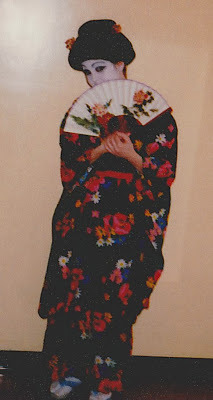For the Writers: The Connection Between Acting and Writing
A little known fact about me is that I initially majored in Drama when I first attended college. As a senior in high school I got a part in the travelling children's show of the local college and garnered a scholarship. When I "stopped out" of college, I still enjoyed participating in community theatre - until I attended a workshop where any confidence I had of my acting abilities was stomped out by the cocky actor giving the workshop.
 Me!
Me!
The artistry behind acting and putting on a production still awes me, though. My husband and I always love to watch the interviews and behind-the-scenes extras included on the DVDs of movies we buy. I am completely fascinated how actors talk about how they come to understand the character they're playing. I never was involved in theatre long enough to really learn how to dig into a character. For me it was always more intuitive and less thoughtful.
Something that has recently occurred to me is that, in order to gain that deep characterization in writing, to make our characters come alive, we need to be actors to all of the characters of our stories. Yes, the beginning is to understand their goals and motivations for the story. We need to know their backstory and values. But we need to go deeper than that.
How do our characters view other characters, in relationship to themselves - and how do the other characters view them. Most of life is cause and effect. Dialogue is a string of verbal reactions to what the other person is saying. Understanding the roles our characters play within their interactions with others can help us create more realistic dynamics.
For example, if character A is younger sister to character B, but has always been the protector because character A is bigger, or less shy, then how would character B react? Would character B feel relieved and go with it, or would character B feel marginalized and resent character A. How would character B demonstrate that resentment?
How does character A feel about being the protector. Does she wish character B would grow up and take responsibility for herself? If we can identify the story within the backstory (character A is younger sister to character B) we can have some real conflict within a very real dynamic.
What kind of personal style do they have, and why? When I was in high school I was a rebel, but also rule-bound. I had no desire to break laws, but I definitely didn't want to identify with the other students who demanded power over everyone else. How did I demonstrate to everyone that they had no power over me? Through my clothing. I was one of 2-3 students in my small, Nebraskan high school of 400 to own studded bracelets and parachute pants (Who remembers those? Really? Now I feel old.) Even today the clothing (casual), jewelry (minimal)- even sunglasses (anything that makes my feel glamorous) - I choose are a demonstration of who I am.
Personal style goes beyond the outward appearance, though. What kind of mannerisms do they have? How do they move? Are there cultural issues that come into play? What kind of communication style do they have?
I promise one day very soon I'll quit talking about Tom Hiddleston, but this is one instance he is a perfect example. Well, actually, it's his ability to play different characters believably that is a perfect example. It's not just the costumes and make-up that transform him from character to character. His face and mannerisms as Loki are very different than when he is Prince Hal (or any of the other characters he's played). He creates an identifiable personal style for each character.
What is the character's public persona versus their private? We all act differently in different situations, because social rules differ depending on where you are. How does the character navigate these changes? Is how they react to things internally different than what they show on the outside? This is one area I love about Hazel in Finding Meara. She is constantly having a totally different dialogue in her head than what she actually says. It's one of the best things about writing in first-person point of view.
I hope this made sense. Even now, my understanding of character development is rather intuitive. I know what I mean, but I'm not sure I have a good enough grasp of it to verbalize it. It's all a learning process, but what an exciting process!
How do you deepen the characterization of your characters? Any tips you'd like to share?
 Me!
Me!The artistry behind acting and putting on a production still awes me, though. My husband and I always love to watch the interviews and behind-the-scenes extras included on the DVDs of movies we buy. I am completely fascinated how actors talk about how they come to understand the character they're playing. I never was involved in theatre long enough to really learn how to dig into a character. For me it was always more intuitive and less thoughtful.
Something that has recently occurred to me is that, in order to gain that deep characterization in writing, to make our characters come alive, we need to be actors to all of the characters of our stories. Yes, the beginning is to understand their goals and motivations for the story. We need to know their backstory and values. But we need to go deeper than that.
How do our characters view other characters, in relationship to themselves - and how do the other characters view them. Most of life is cause and effect. Dialogue is a string of verbal reactions to what the other person is saying. Understanding the roles our characters play within their interactions with others can help us create more realistic dynamics.
For example, if character A is younger sister to character B, but has always been the protector because character A is bigger, or less shy, then how would character B react? Would character B feel relieved and go with it, or would character B feel marginalized and resent character A. How would character B demonstrate that resentment?
How does character A feel about being the protector. Does she wish character B would grow up and take responsibility for herself? If we can identify the story within the backstory (character A is younger sister to character B) we can have some real conflict within a very real dynamic.
What kind of personal style do they have, and why? When I was in high school I was a rebel, but also rule-bound. I had no desire to break laws, but I definitely didn't want to identify with the other students who demanded power over everyone else. How did I demonstrate to everyone that they had no power over me? Through my clothing. I was one of 2-3 students in my small, Nebraskan high school of 400 to own studded bracelets and parachute pants (Who remembers those? Really? Now I feel old.) Even today the clothing (casual), jewelry (minimal)- even sunglasses (anything that makes my feel glamorous) - I choose are a demonstration of who I am.
Personal style goes beyond the outward appearance, though. What kind of mannerisms do they have? How do they move? Are there cultural issues that come into play? What kind of communication style do they have?
I promise one day very soon I'll quit talking about Tom Hiddleston, but this is one instance he is a perfect example. Well, actually, it's his ability to play different characters believably that is a perfect example. It's not just the costumes and make-up that transform him from character to character. His face and mannerisms as Loki are very different than when he is Prince Hal (or any of the other characters he's played). He creates an identifiable personal style for each character.
What is the character's public persona versus their private? We all act differently in different situations, because social rules differ depending on where you are. How does the character navigate these changes? Is how they react to things internally different than what they show on the outside? This is one area I love about Hazel in Finding Meara. She is constantly having a totally different dialogue in her head than what she actually says. It's one of the best things about writing in first-person point of view.
I hope this made sense. Even now, my understanding of character development is rather intuitive. I know what I mean, but I'm not sure I have a good enough grasp of it to verbalize it. It's all a learning process, but what an exciting process!
How do you deepen the characterization of your characters? Any tips you'd like to share?
Published on November 26, 2013 03:00
No comments have been added yet.



